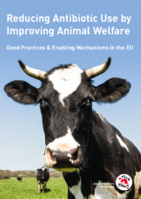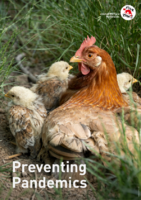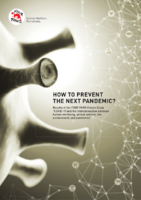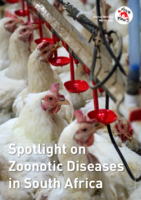
8th World One Health Congress
Animal welfare as part of the One Health approach to combat antimicrobial resistance (AMR)
According to the World Health Organization (WHO), antimicrobial resistance (AMR) – also labelled as the “silent pandemic” – is one of the top ten global threats to public health. In 2019 alone, it caused 1.27 million deaths and contributed to 4.95 million deaths.1 If no action is taken, it could lead to 10 million deaths annually by 2050.1 In addition to the public health cost, AMR also has a financial cost – the World Bank estimates that by 2050, it could cost around 3.8% of the global gross domestic product.2 The misuse and overuse of antimicrobials (including antibiotics, antivirals and antifungals) in humans, animals and plants are the main drivers of the development of drug-resistant pathogens. Considering that 73% of antimicrobials worldwide are used in farmed animals, predisposing factors for infectious diseases that require antimicrobial treatment in farming need to be addressed.
In intensive farming systems, animals are kept in conditions that subject them to multiple stressors, leading to immunosuppression and a heightened risk of injury, increasing the incidence of infectious diseases that require antimicrobial treatment, in addition to the high number of animals in a confined space facilitating the emergence and spread of infectious diseases. Antibiotics are mainly used to treat diseases but are also frequently used to prevent diseases. Some countries still allow the use of antibiotics as growth promoters, contrary to guidance given by international standards.3 Antibiotic residues can also contaminate water and soil, spreading AMR genes to the environment and to other animals and humans. It has been proven that higher animal welfare conditions such as lower stocking density, the use of slower-growing and local breeds and better nutrition management can decrease stress and prevent infections, consequently decreasing the need for antimicrobials.4–7
Promoting high animal welfare states is an essential part of One Health action to reduce antimicrobial use in agriculture with the aim to protect public health from AMR. To incorporate One Health measures effectively, a whole-of-society and whole-of-government approach needs to be implemented. This requires cross-ministerial collaboration and data-sharing, as well as capacity-building at the community level to support sustainable farming practices. Additionally, including civil society and experts in the development of AMR national action plans is essential to leverage all available expertise. Given the growing risks of AMR, bold, coordinated actions are urgently needed to avoid a global health crisis.
In essence, improving animal welfare in farming systems to prevent infections is an effective strategy for limiting antimicrobial use in agriculture. In addition, good animal welfare practices support farmers' livelihoods, the health and well-being of their animals and the viability of food production systems.

FOUR PAWS Open Letter to the 8th One Health Congress
Ahead of World 8th One health Congress, FOUR PAWS in South Africa, Director Fiona Miles wrote an Open Letter to the world leaders and experts gathering in Cape Town, South Africa on the desired outcomes of the congress.

8th World One Health Poster Presentation
FOUR PAWS showcased a poster presentation at the 8th World One Health presentation on the title of "A One Health approach to tackling AMR – better animal welfare policies for reduced antimicrobial usage"
Source
2. Antimicrobial Resistance (AMR). World Bank. [accessed 2024 Aug 20]. https://www.worldbank.org/en/topic/health/brief/antimicrobial-resistance-amr
3. World Organisation for Animal Health (WOAH). Annual Report on Antimicrobial Agents Intended for Use in Animals. Paris; 2024. p. 44. Report No.: 8th Report. https://doi.org/10.20506/amu.3474
4. Boyle LA, Edwards SA, Bolhuis JE, Pol F, Šemrov MZ, Schütze S, Nordgreen J, Bozakova N, Sossidou EN, Valros A. The Evidence for a Causal Link Between Disease and Damaging Behavior in Pigs. Frontiers in Veterinary Science. 2022 [accessed 2023 Oct 18];8. https://www.frontiersin.org/articles/10.3389/fvets.2021.771682
5. Becker J, Schüpbach-Regula G, Steiner A, Perreten V, Wüthrich D, Hausherr A, Meylan M. Effects of the novel concept ‘outdoor veal calf’ on antimicrobial use, mortality and weight gain in Switzerland. Preventive Veterinary Medicine. 2020;176:104907. doi:10.1016/j.prevetmed.2020.104907
6. Rayner AC, Newberry RC, Vas J, Mullan S. Slow-growing broilers are healthier and express more behavioural indicators of positive welfare. Scientific Reports. 2020;10(1):15151. doi:10.1038/s41598-020-72198-x





